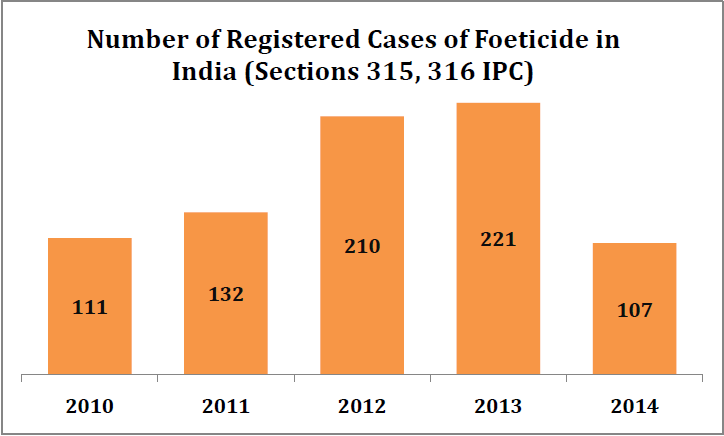[orc]Union Minister for Women & Child Development, Maneka Gandhi had recently suggested that sex determination of foetus be made compulsory to track all pregnant women with a girl child. She suggested this as a measure to check the menace of female foeticide. Given the dismal implementation of PC-PNDT act, it is difficult to believe that any new measure is going to work.
Union minister Maneka Gandhi recently suggested that sex determination test should be made compulsory to track women pregnant with a girl child as a measure to check female foeticide. In this context, we look at the National Crime Records Bureau (NCRB) data on female foeticide and cases registered under Pre-Conception & Pre-Natal Diagnostics Techniques (PC-PNDT) Act to look at the effectiveness of policy measures implemented to curb the adverse sex ratio and whether making sex determination compulsory is likely to work.
The NCRB Data
Sections 315 and 316 of the Indian Penal Code categorize foeticide as a crime. The NCRB collects data on foeticide under the head of crimes against children. As per NCRB, there is no consistent trend in the number of reported cases of foeticide in the country. 111 such cases were reported in 2010, 132 in 2011, 210 in 2012, 221 in 2013 and 107 in 2014.

The NCRB started collecting data on female foeticide only from 2014.The Crime in India Report 2014, chapter titled Crime against Children reports that the crime rate under this head was negligible at an all India level. As compared to 221 cases in the year 2013, number of cases has declined by 51.6%. For the year 2014, total numbers of victims were 107 in 107 cases. Out of 107 victims, 53 were male, 50 were female and sex of 4 foetus was not known.
According to Census 2011, 18 states showed a declining trend in child sex ratio. In 2014, highest number of female foeticide cases were reported in Madhya Pradesh (15), followed by Rajasthan (11). Seven (7) such cases were reported in Punjab. The three states with most adverse child sex ratios – Haryana, Punjab and Jammu & Kashmir have reported 4, 7 and 0 cases respectively.
The implementation of PC-PNDT Act
The data regarding the implementation of Pre-Conception & Pre-Natal Diagnostics Techniques (PC-PNDT) Act was released recently. Since the inception of the Act in 1994, only 50453 bodies (private and public bodies) having equipments capable of detecting sex of the foetus have been registered under this Act. So far a total of 1573 machines have been sealed and seized for violations of the law. A total of 2152 court cases have been filed under the Act and 306 convictions have been secured under this Act. Licenses of 100 doctors have been suspended/ cancelled following conviction under this act. That’s roughly an average seizure of 80 machines a year, 15 convictions a year and 5 suspensions of licenses a year.

Compulsory Sex Determination is the Minister’s Personal view
Responding to a question by Kanimozhi in Rajya Sabha, who asked whether the government is planning to make sex determination legal and how does it plan to track millions of pregnant women and children when it has failed to track 50,000 registered ultrasound machines in the country, Maneka Gandhi told the Rajya Sabha that it was her “personal view” and “not a policy statement”.
How do we plan measures with such little data?
Maneka Gandhi’s suggestion hints at shifting the responsibility to parents while the PC-PNDT Act places the onus on clinics. The child sex ratio is declining and there is no correlation between adverse child sex ratio and cases registered for female foeticide. The state of implementation of the existing law and reporting of cases remains dismal. Given this background, it is hard to believe that making sex determination compulsory is going to work. It is probably time to think about the effectiveness of our current measures to curb adverse child sex ratio rather than think of new measures.



2 Comments
Great write up. Yes, data is statistically insignificant to conclude, but a controlled experiment in India for a district or observing data outside India would help the government decide.
Crux of all problem is dowry meaning thereby greed to get cash, ornaments, household goods etc. free of cost from the family of bride. Govt, people need to do some thing to eradicate this evil of society.